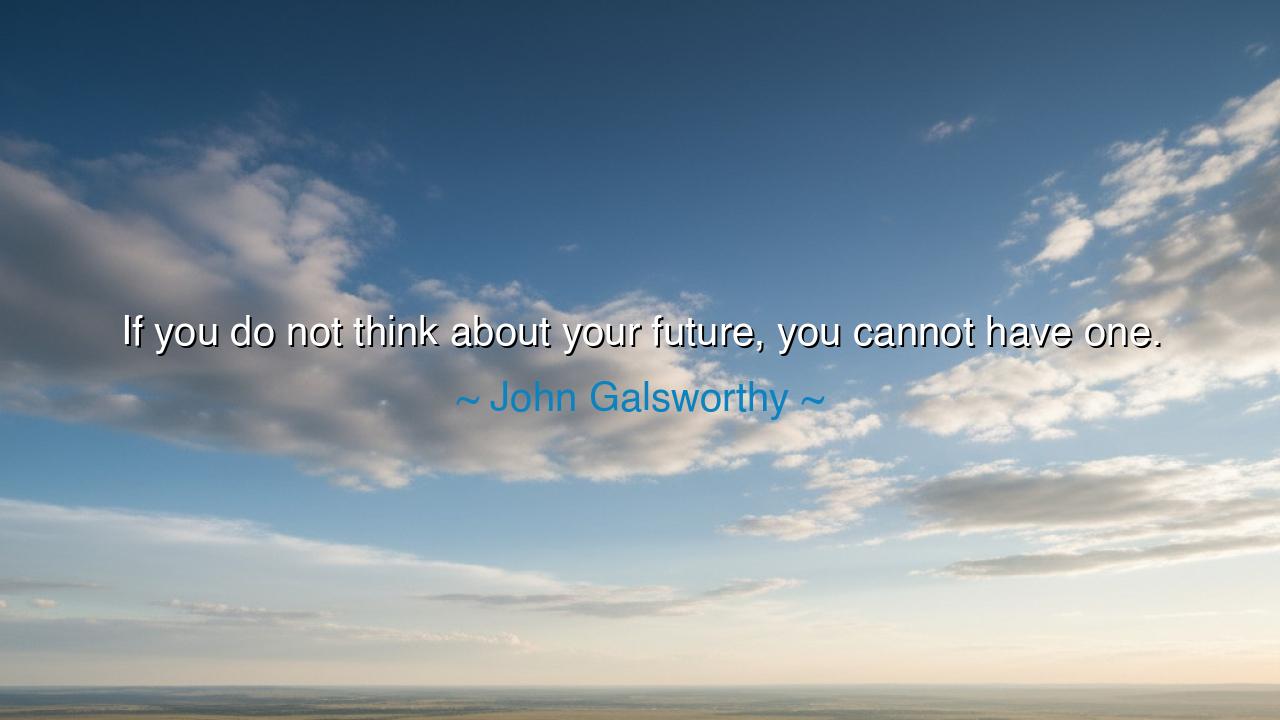
If you do not think about your future, you cannot have one.






John Galsworthy’s profound words, "If you do not think about your future, you cannot have one," invite us into a deep contemplation on the nature of life, destiny, and the importance of vision. These words speak to the idea that the future is not something that merely happens to us, but something that we create, something that is shaped by our thoughts, intentions, and actions in the present. To live without consideration of the future is to abdicate our responsibility to shape it. Galsworthy’s insight teaches us that if we fail to think about what lies ahead, we are not preparing ourselves for the opportunities and challenges that will come. Without this foresight, the future becomes an uncertain and uncontrollable force.
The ancients understood this truth well. The Greeks were known for their profound respect for the future and the role of fate in shaping the lives of individuals and nations. Yet, their greatest heroes, like Odysseus, knew that although fate might be a force to contend with, it was the decisions and wisdom of the present that shaped the future. Odysseus didn’t simply passively accept whatever came his way; he used his intellect, his foresight, and his strength to shape his journey home. His encounters with gods, monsters, and temptations were navigated by a sharp focus on the goal that lay ahead. Galsworthy's words reflect this timeless wisdom: the future is ours to shape, but only if we focus on it, plan for it, and act with intention.
In more recent history, we see the same principle in the life of Thomas Edison, whose vision for the future of technology was a driving force in his monumental achievements. Edison did not simply live for the present—his mind was always focused on what the world could be, not just what it was. His inventions were not born of whimsy but of a clear vision of how the future might look if he succeeded in his experiments. He knew that to create the future, one must think ahead and align one’s efforts with that future. His example shows us that the power of the future lies in our hands, but only if we actively engage with it, envision it, and work towards it with dedication.
Galsworthy’s reflection also brings to mind the journey of Mahatma Gandhi, whose efforts to liberate India were fueled not only by a response to the present injustices but by a clear vision of what a free, unified India could be. He did not simply react to the suffering of his people—he thought deeply about the future he wanted to create and inspired others to act in harmony with that vision. Gandhi’s work was a living testament to the truth that the future is not merely a passive inheritance—it is a space for active creation, one that demands foresight, action, and courage. His life shows that without a vision for what is to come, even the most noble causes can falter.
The lesson from Galsworthy’s words is clear: we must think about the future, not with anxiety or fear, but with the intention to shape it. This thinking requires more than just daydreams or idle thoughts; it demands a clear plan, an understanding of what we want to achieve, and the discipline to act in service of that vision. The future is not a mysterious force that acts upon us, but a realm of possibility that we can influence, for better or worse, depending on the choices we make today. As the ancients would say, the gods may control fate, but it is our actions that write our stories.
In our own lives, let us take Galsworthy's insight to heart. We cannot wait for the future to unfold on its own; we must create it with our choices, our vision, and our actions. Whether in our careers, relationships, or personal development, we must have a clear vision of where we want to go and what we want to become. By focusing on the future, we give ourselves the power to influence it, to build a life that reflects our deepest values and ambitions. Just as Odysseus charted his course home, or Edison worked towards his groundbreaking inventions, so too can we define the future we wish to live in.
Therefore, the call to action is simple yet profound: think about your future, plan for it, and make it a conscious priority in your life. Do not drift through life as if the future will simply happen; instead, be the one who creates it. Whether through education, hard work, or reflection, the future is an extension of today’s choices. Let us not allow the days to pass idly, but seize each moment as an opportunity to shape the destiny we seek. In thinking about the future, we unlock the power to shape it, not only for ourselves but for generations to come.






AAdministratorAdministrator
Welcome, honored guests. Please leave a comment, we will respond soon